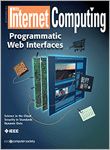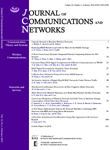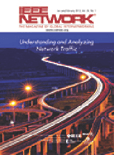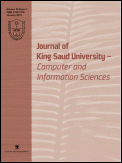
IEEE INTERNET COMPUTING
Scope & Guideline
Charting the Course for Future Connectivity
Introduction
Aims and Scopes
- Data Economy and Market Dynamics:
The journal frequently publishes research on data marketplaces, privacy, and trust management, exploring how data is exchanged and utilized in various sectors. - Artificial Intelligence (AI) and Machine Learning:
A significant focus is placed on AI and machine learning, particularly in the context of responsible AI governance, federated learning, and the development of trustworthy AI systems. - Edge and Cloud Computing:
Research on edge computing and cloud technologies is prevalent, with discussions on optimizing performance, enhancing security, and exploring the integration of these technologies with IoT. - Digital Twin Technologies:
The journal highlights the emerging field of digital twins, focusing on their applications across industries, including healthcare, manufacturing, and smart cities. - 6G and Future Networking Technologies:
There is a consistent emphasis on next-generation networks, particularly 6G technologies, exploring their potential applications and the challenges they pose. - Cybersecurity and Privacy:
Cybersecurity is a core area of research, with papers addressing issues such as privacy threats, data integrity, and ethical considerations in technology use. - Sociotechnical Systems and Ethics:
The journal examines the sociotechnical aspects of computing, emphasizing the ethical implications of technology deployment and the importance of accountability.
Trending and Emerging
- Trust and Accountability in AI:
The importance of trust, accountability, and ethics in AI systems is gaining momentum, highlighting the need for frameworks that ensure responsible AI governance. - Federated Learning and Privacy-Preserving Techniques:
Federated learning is becoming increasingly relevant as researchers focus on privacy-preserving methods that enable collaborative learning without compromising user data. - Digital Twin Applications Across Industries:
The application of digital twin technologies is on the rise, with a growing body of work exploring their potential in diverse fields such as healthcare, smart cities, and manufacturing. - 6G Technologies and Their Implications:
With the upcoming rollout of 6G, research is intensifying around its implications for networking, including new architectures, applications, and challenges. - Edge Computing Innovations:
Innovations in edge computing are emerging, particularly in the context of IoT and real-time data processing, as demand for low-latency solutions grows. - Cybersecurity in Complex Systems:
The focus on cybersecurity is evolving, with an increasing emphasis on addressing security challenges in complex, interconnected systems, particularly in the context of IoT and smart environments.
Declining or Waning
- Traditional Cloud Computing Models:
Research focusing solely on traditional cloud computing models has decreased as the community shifts towards more integrated approaches that combine cloud with edge and IoT technologies. - Basic Data Mining Techniques:
There is a noticeable decline in papers centered on basic data mining techniques without integration into broader frameworks or applications, as the field moves towards more complex and contextualized data analytics. - General Internet of Things (IoT) Applications:
While IoT remains a crucial area, the focus has shifted from generic applications to more specialized uses, particularly those involving security, privacy, and advanced data management. - Static Security Frameworks:
The emphasis on static security frameworks has waned, as researchers are increasingly interested in dynamic and adaptable security measures that address evolving threats. - Legacy Networking Protocols:
There is a decline in research related to legacy networking protocols, with a growing interest in innovative solutions that align with the demands of emerging technologies like 6G.
Similar Journals

IEEE Communications Surveys and Tutorials
Advancing Knowledge in Communications EngineeringIEEE Communications Surveys and Tutorials is a premier journal published by the IEEE-INST ELECTRICAL ELECTRONICS ENGINEERS INC, renowned for its insightful contributions to the field of communications engineering. Since its inception in 2005, this journal has become an authoritative source of comprehensive surveys and instructional materials addressing current trends and advancements in communication technologies. With an impressive Q1 ranking in Electrical and Electronic Engineering, it ranks first among 797 journals in its category, placing it firmly in the 99th percentile according to Scopus metrics. Researchers, professionals, and students alike benefit from its well-researched articles, making it an essential resource for those seeking to deepen their understanding or stay updated on cutting-edge innovations. Although it does not currently operate as an open-access outlet, the journal's commitment to excellence ensures that each publication is a valuable asset for the academic community.

JOURNAL OF COMMUNICATIONS AND NETWORKS
Elevating Knowledge Exchange in the Digital AgeJOURNAL OF COMMUNICATIONS AND NETWORKS, published by the Korean Institute of Communications Sciences (KICS), is a leading academic journal that has been at the forefront of the fields of Computer Networks and Communications as well as Information Systems since its inception in 1999. With a strong commitment to advancing research in these critical areas, this journal has achieved a prestigious Q1 ranking in both domains as of 2023, reflecting its significant impact and innovative contributions to the field. The journal features original research, review articles, and technical notes that address the latest advancements in communication technologies, network architecture, and data management strategies. As a vital resource for researchers, practitioners, and students, it not only disseminates valuable findings but also fosters collaboration and knowledge exchange among diverse disciplines within the communications landscape. With a consistent annual volume, the journal continues to shape the future of communications science and offers authors an esteemed platform to showcase their work.

JOURNAL OF SUPERCOMPUTING
Exploring Innovations in Computational ExcellenceJOURNAL OF SUPERCOMPUTING is a premier academic journal published by SPRINGER, situated in the Netherlands, that has made significant contributions to the fields of computer science, particularly in hardware and architecture, information systems, software, and theoretical computer science. With a robust publication history spanning from 1987 to 2024, this journal has cultivated a strong reputation, evidenced by its Category Quartiles ranking in the Q2 category across multiple relevant domains in 2023. The journal's Scopus rankings further underscore its influence, boasting a 78th percentile in mathematics and theoretical computer science, revealing the high quality of research disseminated within its pages. As vital discourse unfolds in the realm of supercomputing—where innovative techniques and technologies rapidly evolve—this journal serves as a crucial platform for researchers, professionals, and students to explore cutting-edge studies and build upon the foundations of knowledge in this dynamic field.

Journal of Cloud Computing-Advances Systems and Applications
Harnessing the Potential of Cloud for TomorrowThe Journal of Cloud Computing - Advances Systems and Applications, published by Springer, serves as a premier platform for disseminating cutting-edge research in the fields of cloud computing, computer networks, and software technologies. With an impressive impact factor and ranked in the top quartile for Computer Networks and Communications and Software categories in 2023, this open access journal has gained significant recognition within the academic community since its establishment in 2012. The journal not only provides valuable insights into innovative applications and advancements in cloud technologies but also supports collaboration among scholars, practitioners, and industry leaders. Operating from the vibrant hub of New York City, it boasts a robust international readership, ensuring that the latest findings reach a diverse audience. Authors and researchers are encouraged to engage with this vital resource, which is dedicated to exploring the transformative potential of cloud computing across multiple disciplines.

International Journal of Grid and Utility Computing
Empowering Research in Utility Computing ApplicationsInternational Journal of Grid and Utility Computing is a pioneering publication dedicated to advancing research in the domains of grid computing, utility computing, and their applications across various sectors. Initiated in 2005 and continuing through 2024, the journal is published by INDERSCIENCE ENTERPRISES LTD, a respected publisher known for its commitment to facilitating scholarly communication. With an ISSN of 1741-847X and an E-ISSN of 1741-8488, this journal, based in the United Kingdom, serves a global audience of researchers, professionals, and students. Although classified in the Q4 category across Applied Mathematics, Computer Science Applications, and Management Information Systems, the journal aims to bridge theoretical research with practical implementation, fostering interdisciplinary collaborations. Researchers looking for a platform to disseminate their work on grid technology and its utility in modern computing environments will find this journal an invaluable resource. The focus on innovative computing methodologies places it at the forefront of emerging trends and technology applications, despite the need for increased visibility in competitive metrics like Scopus rankings.

Computer Science and Information Systems
Exploring the Depths of Computer Science ExcellenceComputer Science and Information Systems, an esteemed journal published by the COMSIS CONSORTIUM, serves as a vital platform for researchers and practitioners within the field of computer science and information systems. With an ISSN of 1820-0214, this open access journal has been disseminating high-quality research since 2004, making scholarly content readily accessible to a global audience. Based in Novi Sad, Serbia, the journal has established itself as a point of reference in the academic community, achieving a Q3 ranking in the Computer Science (miscellaneous) category as of 2023. With its coverage spanning from 2008 to 2024, it caters to a diverse range of topics, including software engineering, data processing, and system architecture. Although the HIndex is currently not available, the journal holds a respectable 43rd percentile ranking in the Scopus database for general computer science, showcasing its relevance in the field. By offering an open access model, it ensures that groundbreaking research can be freely accessed and utilized, fostering innovation and collaboration across disciplines.

IEEE NETWORK
Delivering Cutting-Edge Research in NetworkingIEEE NETWORK is a premier journal published by the IEEE-INST ELECTRICAL ELECTRONICS ENGINEERS INC, dedicated to advancing the field of computer networks and communication systems. Recognized for its rigorous peer-review process, this journal holds a prestigious Q1 ranking in multiple categories including Computer Networks and Communications, Hardware and Architecture, Information Systems, and Software according to the 2023 metrics. With a focus on delivering cutting-edge research findings and innovative technologies, IEEE NETWORK aims to bridge academia and industry, providing a vital platform for the dissemination of knowledge among researchers, professionals, and students. While it operates under a subscription-based model, the journal remains a key resource for those seeking to stay informed on the latest trends and developments in the networking domain. Established in 1986 and continuing its publication through 2024, it serves as a critical reference for impactful research that shapes the future of networking technologies.

Journal of King Saud University-Computer and Information Sciences
Fostering Excellence in Global Technological ResearchJournal of King Saud University-Computer and Information Sciences, published by ELSEVIER, is a prestigious open-access journal focusing on the rapidly evolving fields of computer science and information technology. Since its inception in 1996, this journal has provided a platform for high-quality research and innovative ideas, promoting the dissemination of knowledge to a global audience. With a remarkable impact factor and ranked Q1 in the Computer Science (miscellaneous) category as of 2023, it stands among the top 11% of journals in its field, reflecting its commitment to excellence and relevance. The journal proudly carries the ISSN 1319-1578 and E-ISSN 2213-1248, and it is based in Saudi Arabia while being part of a global academic network. With a Scopus rank of #26 out of 232 in general computer science, the Journal of King Saud University-Computer and Information Sciences is an essential resource for researchers, professionals, and students seeking to stay at the forefront of technological advancement. As it continues to thrive through 2024, it invites contributions that will shape the future of computing and information sciences.

Future Generation Computer Systems-The International Journal of eScience
Shaping Tomorrow's Technology TodayFuture Generation Computer Systems - The International Journal of eScience, published by ELSEVIER, stands at the forefront of the fields of computer networks, hardware architecture, and software engineering, as evidenced by its impressive Q1 quartile rankings in 2023 across these categories. With an ISSN of 0167-739X and an E-ISSN of 1872-7115, this esteemed journal has been a significant contributor to the body of knowledge in the computer science domain since its inception in 1984, continuing to shape the landscape of eScience through cutting-edge research and innovative practices. Featuring a broad scope that embraces various interrelated disciplines, Future Generation Computer Systems is particularly recognized for its high impact factor and prestigious Scopus rankings, where it ranks in the top echelons—8th in Computer Networks and Communications, 5th in Hardware and Architecture, and 17th in Software—placing it in the 95th to 98th percentiles of their respective fields. Although currently not open access, the journal provides invaluable insights and advancements aimed at researchers, professionals, and students alike, driving the evolution of technology and its applications in an increasingly digital world.

Journal of Grid Computing
Illuminating Trends in Computer Networks and ArchitectureThe Journal of Grid Computing, published by Springer, stands as a pivotal resource in the dynamic field of computer science, particularly within the realms of Computer Networks and Communications, Hardware and Architecture, Information Systems, and Software. With an impressive Q1 ranking across these categories in 2023, the journal exemplifies excellence and rigor, catering to a diverse readership from researchers to industry professionals. Established in 2003, this esteemed journal is anchored in the Netherlands and releases cutting-edge research that reflects trends and advancements in grid computing technologies. Researchers can gain insights through its vast contributions, while institutions benefit from its prestigious standing within the SCOPUS framework, boasting high percentile ranks in multiple computer science categories. Though not open access, the journal provides unparalleled access options for institutional subscribers, solidifying its importance as a gateway to innovative discoveries in high-performance distributed computing.